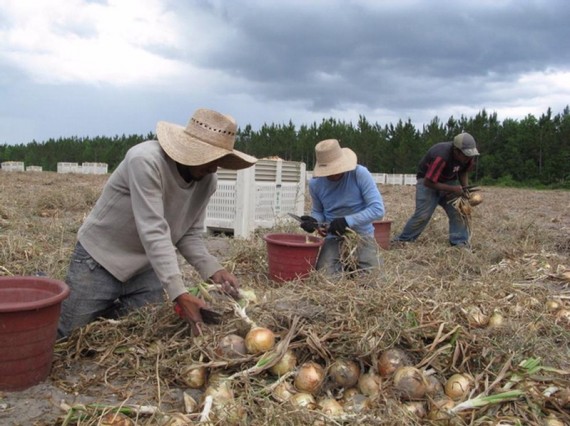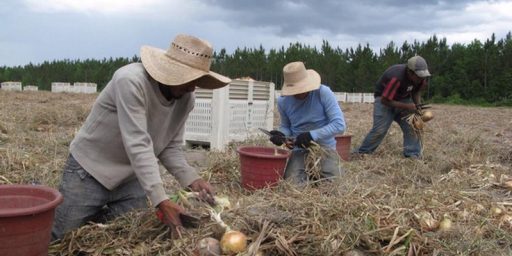Farmers Finding Few Americans Willing To Do Jobs Immigrants Do
It turns out there are some jobs immigrants will do, but Americans won't
The unemployment rate is above 9% and some people have been out of work for more than a year, but one segment of the economy is finding that there are indeed jobs Americans won’t do:
OLATHE, Colo. — How can there be a labor shortage when nearly one out of every 11 people in the nation are unemployed?
That’s the question John Harold asked himself last winter when he was trying to figure out how much help he would need to harvest the corn and onions on his 1,000-acre farm here in western Colorado.
The simple-sounding plan that resulted — hire more local people and fewer foreign workers — left Mr. Harold and others who took a similar path adrift in a predicament worthy of Kafka.
The more they tried to do something concrete to address immigration and joblessness, the worse off they found themselves.
“It’s absolutely true that people who have played by the rules are having the toughest time of all,” said Senator Michael Bennet, a Democrat from Colorado.
Mr. Harold, a 71-year-old Vietnam War veteran who drifted here in the late ’60s, has participated for about a decade in a federal program called H-2A that allows seasonal foreign workers into the country to make up the gap where willing and able American workers are few in number. He typically has brought in about 90 people from Mexico each year from July through October.
This year, though, with tough times lingering and a big jump in the minimum wage under the program, to nearly $10.50 an hour, Mr. Harold brought in only two-thirds of his usual contingent. The other positions, he figured, would be snapped up by jobless local residents wanting some extra summer cash.
“It didn’t take me six hours to realize I’d made a heck of a mistake,” Mr. Harold said, standing in his onion field on a recent afternoon as a crew of workers from Mexico cut the tops off yellow onions and bagged them.
Six hours was enough, between the 6 a.m. start time and noon lunch break, for the first wave of local workers to quit. Some simply never came back and gave no reason. Twenty-five of them said specifically, according to farm records, that the work was too hard. On the Harold farm, pickers walk the rows alongside a huge harvest vehicle called a mule train, plucking ears of corn and handing them up to workers on the mule who box them and lift the crates, each weighing 45 to 50 pounds.
“It is not an easy job,” said Kerry Mattics, 49, another H-2A farmer here in Olathe, who brought in only a third of his usual Mexican crew of 12 workers for his 50-acre fruit and vegetable farm, then struggled to make it through the season. “It’s outside, so if it’s wet, you’re wet, and if it’s hot you’re hot,” he said.
Still, Mr. Mattics said, he can’t help feeling that people have gotten soft.
“They wanted that $10.50 an hour without doing very much,” he said. “I know people with college degrees, working for the school system and only making 11 bucks.”
This isn’t entirely surprising, of course. We saw the same thing in operation in Georgia earlier this year when a new law aimed at illegal immigrants caused migrant farm workers to flee the state, leaving farmers with crops rotting in the field. When those farmers tried to make alternative arrangements and hire locally, they found very few people willing to do the work, and even fewer who could do the job as quickly and efficiently as the illegal immigrants who used to do it. A similar law enacted in Alabama was seen to have a similar impact on the construction industry.
Immigrants, regardless of their legal status, are uniquely suited for this type of work for many reasons. Farming requires quick action with harvest time comes; crops need to be picked when they’re ready to be picked. Farmers simply can’t afford to wait for apply for a pickers job when they’re not even sure they’ll keep up with it. Migrant workers exist because there’s a market for them. They don’t stay in one place very long (hence the migrant part) because once they’re done picking in one place, they move on to another. That’s why its the kind of job that attracts undocumented immigrants, because most of them don’t have fixed addresses to begin with so the idea of spending the summer traveling the country doesn’t bother them as much as it would the average American worker.
Immigration opponents constantly repeat the refrain that immigrants take jobs away from Americans. In reality, most immigrants are doing jobs that Americans don’t want to do, or that they’d only for for an exorbinantly high rate of pay that would make the price of ordinary goods prohibitively high, thus harming American competitiveness. Today, they’re the people doing things like picking crops in the field or framing houses. A hundred years ago they were mining coal and digging railroad tunnels. They’re willing to do the work because they’re willing to sacrifice to make a better life for themselves and their families. If they were really stealing jobs from Americans, then we’d see some evidence of it. Instead, we get farmers like Mr. Mattics who took a gamble on the idea that out-of-work Americans would be grateful for a chance to work, and lost.







Of course, those teachers have healthcare and a pension plan. Farm laborers have neither, and are vastly more likely to have long-term job-related health problems. They will also have no other alternative supports when they can no longer work in that field. Tell me again why Americans don;t want that kind of work?
It’s tough adjusting to the tightening of illegal immigrant labor, if you’re like most American farmers. But if we had a national law limiting illegal immigration to a specific number of guest workers a year, plus tighter enforcement (hitting the employers is the right direction), I suspect that you would see farmers starting to move (back) towards greater mechanization of farming.
It’s rough, but they’re going to have to do it anyways in ten years, when the supply of cheap Mexican labor dries up for economic and demographic reasons.
@Brett: Mechanization will only get you so far when it comes to farming and there are some crops where it’s not really possible. When I was kid I detaslied corn every summer, it was hard work and it really sucked walking up and down long rows of corn every day but the cash in my pocket was always nice to have. If it meant the difference between being tossed out on the street or keeping my home I’d do that type of work today, but I know a lot of people that would pack up everything and live in their car before doing that type of work. It’s nuts if you ask me.
I’ve got no problem with the H-2A program and the H-2B program for temporary construction workers in the event of disasters. I’ve got a problem with employers who don’t use them.
Its not ideal though. In parts of the country with higher land productivity, your corn is going to be picked by machine. Other first world countries rely on greenhouses to spread out the growing season and avoid the problems with seasonal labor. We apparently have tomato farmers who can’t pay a legal wage to compete with tomatoes coming from both unskilled labor in Africa and advanced tech outfits in the Netherlands.
@Vast Variety: “When I was kid I detaslied corn every summer, it was hard work and it really sucked walking up and down long rows of corn every day but the cash in my pocket was always nice to have.”
I did too. Its true that last I knew, machines could imprecesily cut off the tops of the plant but you needed field hands to walk the rows. I suspect the technology will improve though.
Part of the issue might be that people live further from agriculture than in the past, which means fewer kids nearby.
Sounds like a good reason for unemployment reform…
J.
US citizens are overweight and soft. I have to wonder how much of it is not wanting to do the work as opposed to being physically unable to do the work. I haven’t seen a non Hispanic putting on a new roof for years.
What do you expect when:
1) only 2% of Americans farm anymore, so hardly anyone has experience with this type of labor
2) you’ve air-conditioned people from childhood and conditioned (ha) them to expect the same for the rest of their life
3) you’ve fed that corn by the bushel into everyone, but especially the poor and unskilled, so that they’re physically unable to do the labor
4) you’ve actively discouraged Americans from these jobs through policy in an effort to keep wage down (and to keep the skilled, cheaper, faster, better Mexican workers).
Don’t push a “service” or “information” economy down society’s throat then act all mystified when most of society is unable to do manual labor.
Also Doug I fixed this line for you.
They’re willing to do the work because
they’re willing to sacrifice to make a better life for themselves and their familiesthey don’t have a choice as every other job on the market has been actively denied to them.I heard this refrain in Holland 25 years ago: “The Turkish guestworkers are meant to do the work that no respectable Dutchman would think of doing,” said an imperious fellow. The Dutch wound up with 250,000 guestworkers on the books then, and fully 100,000 of them were on the very generous Dutch welfare system that afforded them 60% of their last pay until they could obtain “similar” work.
It didn’t take the workers long to figure out that their standard work positions just happened to be very unique indeed, and mostly unavailable, which permitted them to continue to draw that 60% over and over, year after year. A cautionary tale?
This will sound cruel, but I don’t sympathize with these jobless people who need money, and yet still won’t do specific work. Maybe I was raised differently, but these people don’t seem to understand what it means to *SURVIVE*.
@Ron Beasley:
My family is in construction and I’ve done some roofing. It was the hardest, most unpleasant and dangerous job I’ve done. We’ve seen the same thing – most roofers are hispanic.
Here’s a different point — tied into these — at what point do we want to admit that food prices might need to be adjusted to make a no-migrant worker system work?
To what degree has Walmart and other retailer’s pursuit of the lowest price/highest margin essentially created a system where the only way to reach that price point is through illegal labor?
@ Doug
Well, yeah. Put another way, the real reason, at least as far as agriculture goes, is we do not want to pay $5.00 for a head of lettuce. That’s the beginning and the end of it.
Conservatives bemuse me. Apparently, manual field labor is noble and invigorating and Americans are too lazy and coddled to do it, so we need illegal migrants. At the same time, we don’t want the hardest-working, family oriented, dedicated people from other nations doing it because they might settle here seeking a better life for themselves and their families?
@Christopher Bowen: And what mighty tasks do you do for a living, sir?
@Brett:
Nice freudian slip to show how when the nativists say “illegal immigration” they really mean all immigration.
@Stormy Dragon:
I have no idea what you’re talking about, or why you took my comment about “illegal immigration” to mean all immigration.
@Brett:
implies that they could be here under legally authorized guest worker program and still qualify as “illegal” immigrants.
In Washington Dc, virtually very taxi driver and private bus driver is an immigrant. When did driving a cab become skilled labor and Americans are incapable of doing? Virtually bus boy is an Hispanic immigrant. When did washing dishes become a skill that Americans did not know how to do? Virtually very janitor cannot speak English. When did mopping floors become skilled labor that Americans are not capable of doing.
If we keep letting in people to do the work that Americans won’t do we so will have an economy incapable of keeping people employed and with high taxes to pay the welfare benefits of people who refuse to work.
It country that has a population so unskilled that it cannot mow the lawn, wash the dishes, or hang dry wall is not a country that is doing to be around much longer.
@superdestroyer: I’m sure you are helping turn the tide by pushing a broom in your day job. Yay for the white race!
@superdestroyer: I am usually offended by your racist and xenophobic rants but I really can’t argue with much of this comment.
@mannning: I lived in Munich from 1968 to 1972 and Munich had a large number of Turkish workers and in fact had a Turkish district. The origin of this was not originally that Germans didn’t want to do the work but after WWII there simply wern’t enough able bodied Germans to do the work. It may have eventually morphed into the situation you describe where the natives were unwilling or perhaps unable to do the work. I think that’s where we are in the US – most of the US population is simply unable to do to do the work – they are too fat and too soft. The reality is that if we deport all the illegals we will all starve to death under leaky roofs.
I have a friend, elderly and of the Southern Democrat persuasion. He’s been saying for years (well before the recession started in ’08) that the Mexicans are eating our lunch, most specifically the African-Americans who won’t do these jobs.
Yes, I would take mannning’s cautionary tale into account for long-term planning, but if you want cheap labor now – it’s available.
From what I could find on the web minimum wage in Mexico is about $4 a day in US dollars. I’m pretty sure that if US citizens could get 20 times minimum wage, $140/ hour, in Canada you’d see an endless stream of people heading there to cheerfully do stoop labor.
I am sure that thousands of hardworkinghonestdecentteapartyamericanswhohavelosttheirjobsbecauseofobamsfloodofredtapeandregulationsandfornootherreason are flocking to work these jobs and the MSM is covering it up…
@superdestroyer:
Before we had Irish and Jews do that work. Somehow they successfully integrated into our society as if by magic when we stopped irrationally hating them.
@mattb:
Ding ding ding ding ding we have a winner!
Slavery hasn’t vanished…we’ve just renamed it “globalization” and pay people a small stipend. The slaves get the most unpleasant jobs that people refuse to compensate fairly. And while they might be the hardest working, best laborers we’ve ever had, they’re still slaves and we must hate them because one might get sick and need healthcare or have children who need education.
@Franklin:
Yeah, I can’t imagine what an African-American working for minimum wage in a field in a rural area where everyone treats them like garbage must feel like. Clearly they’re simply lazy.
@Lit3Bolt:
Well, I can’t really be called a conservative, but your second sentence sums up my objections not just to right-ish hysteria about “closing the borders!!” but to our current immigration policies generally. The people who are coming here illegally – ones with the ambition to do better and the gumption to pick up sticks and move to a different country with a different language at significant risk to themselves to do it – seem like exactly the sort of people we WANT.
I do have time for the argument that a lot of the success of American economy is based on what we vaguely think of as WASP-y values that have been taken up as the background culture of society as a whole, and to the extent that immigration from other cultures might alter that existing culture in negative ways there might be some legitimate concern.
But the vast majority of the illegal immigrants coming here seem to be coming here because they embrace those aspects of American culture. They want to come here because it’s NOT Mexico, and they don’t want it to be. They frankly want to be assimilated. The vast majority of illegal immigrants come here to put the Protestant work ethic into practice, make money, mind their own business, get a truck and a house in a neighborhood with good schools and support their families in the style to which they would like to become accustomed. Sounds … pretty damn American to me.